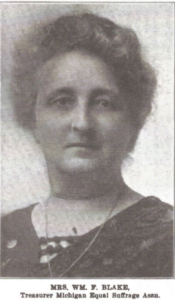About Alde Blake (1857–1925)
Although Alde Louise Tuck Blake described herself as “preeminently a home woman,” her civic life in Grand Rapids illustrates that she claimed and practiced her rights as an American citizen in every way open to unenfranchised women at the turn of the twentieth century.
Born in 1857 Maine, Blake had come of age while women’s clubs and reform movements were blossoming and training women to use their talents on public stages. New to Grand Rapids during the 1890s, Blake was soon serving as secretary of the prestigious Ladies Literary Club and graduated to president of the Consumer’s League. Then, this “suffragist from her earliest recollection” helped the Susan B. Anthony Club host the national suffrage convention, here in 1899 for the only time it ever met in Michigan. Later that same year, she won a race for the Grand Rapids School Board and made national news for adding a third woman member.
Blake served for two years; then her electoral life went into the doldrums, at the same time the state suffrage movement declined. A new state charter had revoked the ability of non-voters to petition the legislature; but in 1910 when national events sparked new life into the movement, Blake became a charter member of the Grand Rapids Equal Franchise Club. By 1913, she had also joined the Michigan Equal Suffrage Association board and served as treasurer for five years.

Alde Blake, December 18, 1918, The Woman Citizen
Suddenly, in 1912 the state legislature put a full woman suffrage amendment in front of the state’s male voters. Blake ran the state office in Grand Rapids, which handled six tons of literature in short order. As the state’s campaign secretary, Blake was commended as having “worked as hard and faithfully for women’s suffrage as any woman in the state.” And the work was crucial. If Michigan women were fully enfranchised and joined the women of nine western states, a strong signal could be sent east from the “conservative middle west.” The defeat was bitter. Still, suffrage organizations kept up the heat and women pivoted to service on civic committees. For one example, Blake represented the Federation of Women’s Clubs on a city morals commission.
Suffragists stepped up for another state campaign introduced in 1918, even though they were working in wartime roles and facing a terrible pandemic. After a stunning push, Michigan women finally became full voting citizens in November 1918—and Blake exercised her new rights by entering electoral politics again in 1920. She ran for the Michigan State House in the first election when women were able to run. She did not win, but she had put up a fight! After the 1918 enfranchisement, when Michigan women were suddenly valuable to political parties, Blake was appointed to the Republican state central committee. She was unafraid to make waves and engaged in well-publicized struggles against the state political machine. Although she was removed for bucking party boss Frank McKay, Blake’s political life continued. The suffrage movement had evolved into the League of Women Voters, and Blake was elected its first state treasurer.
Before her death in 1925, Alde Blake had not only achieved her rights. She had used them.
“I believe we can do more for the home with the vote,” Alde Blake told an interviewer in 1913. Her family concurred–for Blake’s was not a solo act. Her grandson Paul Kutsche, a retired cultural anthropologist, demonstrated in a 2006 paper how Blake’s supportive family had made negotiations and sacrifices enabling her achievements; and today, two great-grandchildren continue research honoring their entire “suffrage family.” Not only did Blake’s four daughters, including Kutsche’s mother, become committed suffragists as they came of age; her husband, William F. Blake, and an uncle saw that the Blakes’s first home in Grand Rapids was placed in Alde’s name, granting her the franchise then available to tax-paying women. Theirs was very much a family endeavor.
Sources
Alde Louise Tuck Blake Scrapbook, Grand Rapids Public Library Scrapbook Collection (Coll. 239), Grand Rapids History Center.
Campaign Information
FIRST CAMPAIGN
Political Office: Board of Education
Election Year: 1899
Party Affiliation: Nonpartisan race
Elected: Yes
SECOND CAMPAIGN
Political Office: Board of Education
Election Year: 1901
Party Affiliation: Nonpartisan race
Elected: No
THIRD CAMPAIGN
Political Office: Board of Education
Election Year: 1902
Party Affiliation: Nonpartisan race
Elected: No
FOURTH CAMPAIGN
Political Office: Library Commission
Election Year: 1903
Party Affiliation: Nonpartisan race
Elected: No
FIFTH CAMPAIGN
Political Office: State Representative (primary election)
Election Year: 1920
Party Affiliation: Republican
Won: No
Biographical Information
Full Name: Alde Louise Tuck Blake
Life Dates: June 8, 1857–April 29, 1925
Birthplace: Falmouth, Maine
Marital Status: Widowed in 1915
Occupation: Educator, Politician
Political Affiliation: Republican
Social Reform Activism: Women’s Suffrage, Women’s Clubs, Civic Reform
